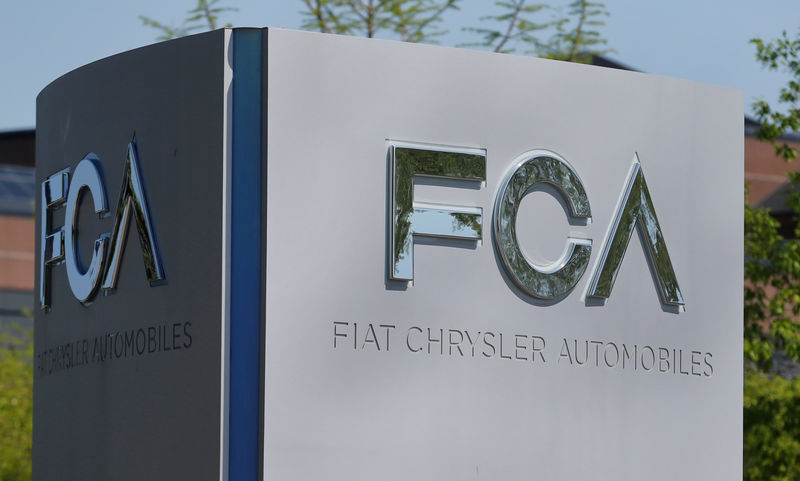By David Shepardson
WASHINGTON (Reuters) - Fiat Chrysler Automobiles NV told Reuters on Thursday it paid $77 million in U.S. civil penalties late last year for failing to meet 2016 model year fuel economy requirements, the first significant sign the industry is facing hurdles meeting rising emissions rules.
The Italian-American automaker has been lobbying the Trump administration to revise fuel economy requirements and last year regulators proposed freezing requirements at 2020 model-year levels through 2026.
Shane Karr, head of external affairs for Fiat Chrysler in North America, said in a statement the fuel economy program should be reformed rather than "requiring companies to make large compliance payments because assumptions made in 2011 turned out to be wrong."
Karr added that the automaker is "committed to improving the fuel efficiency of our fleet and expanding our U.S. manufacturing footprint."
The National Highway Traffic Safety Administration (NHTSA) said in a report dated Dec. 21 that the industry faced $77 million in fines in 2016 and that one unnamed manufacturer "is expected to pay significant civil penalties." The agency did not immediately comment on Thursday.
The civil penalty payment is much higher than in prior model years. The industry paid $2.3 million in civil penalties in 2014 and $40 million in 2011.
Under federal rules, automakers can accrue credits for overcomplying in some years. In 2012, the Obama administration finalized rules requiring automakers to nearly double the fleet-wide fuel efficiency of vehicles to more than 50 miles per gallon by 2025, but the Trump administration has proposed rolling back those requirements starting in the 2021 model year.
NHTSA also noted that the number of automakers' fleets with credit shortfalls had risen to 26 in 2016, up from 18 in 2011, and the number of surpluses fell from 26 in 2011 to 15.
Steve Bartoli, a Fiat Chrysler vice president who oversees fuel economy issues, said in September at a public hearing on the fuel rules that starting in 2016 the auto industry had been unable to meet current requirements without using credits earned from prior model years. Bartoli called the gap "a wake-up call that assumptions made seven years ago about the U.S. auto market need to be revisited."
The NHTSA report also said automakers collectively face projected shortfalls of about $1.2 billion for both the 2017 and 2018 model years, but it was unclear how much in credits can be used to offset the deficits.
Fiat Chrysler said the payment was anticipated and the costs were included in the company’s fourth-quarter financial results released on Thursday.
The company has previously purchased emissions credits from Tesla (NASDAQ:TSLA) Inc, Toyota Motor Corp and Honda Motor Co.
Fiat Chrysler paid penalties for its domestically produced car fleet that did not meet efficiency requirements. It noted rules governing domestically produced cars restrict the use of credits.
The company explained the shortfall in part by noting that starting in the 2011 model year some front-wheel-drive utility vehicles previously classified as trucks were moved to the car fleet, which have much tougher fuel-efficiency requirements.
Fiat Chrysler noted those vehicles are taller and require more energy than sedans. In 2016, the company produced four such vehicles: the two-row Dodge Journey, Jeep Cherokee, Jeep Compass and Jeep Patriot.
By contrast, Fiat Chrysler said its average light-truck fuel economy in 2016 was higher than Toyota, Ford Motor (NYSE:F) Co and General Motors Co (NYSE:GM), while its car numbers were significantly lower.
The Trump administration said last year the fuel economy freeze would save the automakers more than $300 billion in regulatory costs.

Trump’s proposed freeze would result in 500,000 barrels per day more oil consumption by the year 2030. California says the proposal "would worsen air quality for the most vulnerable (and) waste billions of gallons of gasoline."